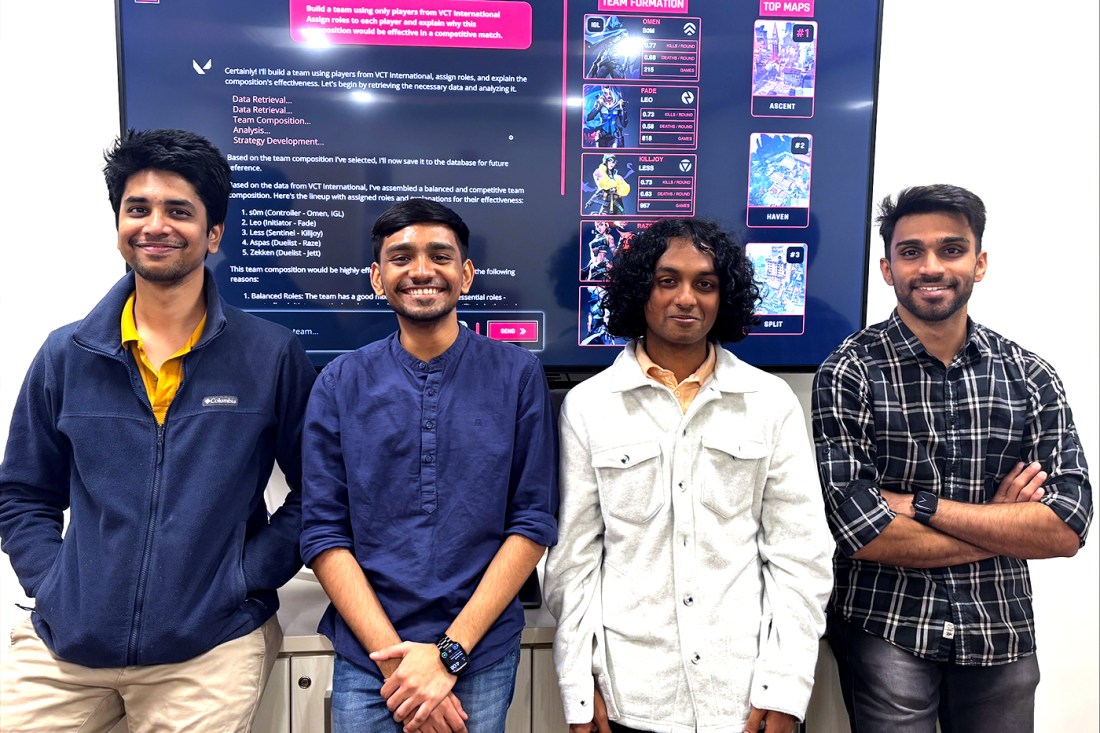How AI is changing esports: Northeastern students win big at Valorant challenge
“It is kind of like fantasy football where you’re trying to build your own dream team that you are hoping would win,” says Dhruv Kamlesh Kumar. “This is a tool that can help you build that team based on real gamer data.”

In the past few years, Northeastern graduates Dhruv Kamalesh Kumar and Aravind Dasarathy have logged more than 1,000 hours playing the competitive online action game Valorant.
For fans, those numbers aren’t shocking. Since its release in 2020, the free-to-play game has amassed a player base of about 19 million active monthly users. There’s an addicting and fun quality to the tactical hero shooter that keeps people coming back, Kamalesh Kumar and Dasarathy explain.
As computer scientists, the pair share another hobby — testing generative artificial intelligence technologies.
In December, they were able to bring those two hobbies together to win second place in Amazon Web Services’ Valorant Champions Tour (VCT) Hackathon Esports Manager Challenge.

They were part of a four-person Northeastern team that included fourth-year student Rudra Sett and graduate student Akshay Gunjur.
Kamalesh Kumar and Sett met while working as co-ops as part of the Burnes Center for Social Change’s AI for Impact co-op program. Kamalesh Kumar continues to work full-time for the program, building AI products for the public good.
For the challenge, the team was tasked with building a large language model chatbot designed to help managers of the Valorant Champions Tour, the game’s official esports league, recruit talented competitive players.
The team bested its competition made up of more than 3,200 participants with its chatbot VCT Scout, which they built taking advantage of Amazon’s suite of generative AI technologies and Anthropic’s Claude API. To train the model, the team was provided a terabyte of player data from Amazon.
The finished product works similarly to OpenAI’s ChatGPT or Google’s Gemini. Valorant team managers can ask VCT Scout using natural language to build a team composed of competitive Valorant players based on certain ranking and criteria, the team explains.
Editor’s Picks
To a layperson the idea of building a chatbot specifically for Valorant team managers might seem strange. How much of a real demand is there for this kind of technology?
Valorant tournaments are held throughout the years, and teams compete often for cash prizes that can sometimes reach millions of dollars, Kamalesh Kumar says.

“It is kind of like fantasy football, where you’re trying to build your own dream team that you are hoping would win,” Kamlesh Kumar says. “This is a tool that can help you build that team based on real gamer data.”
As a major Valorant fan, Dasarathy says it was rewarding to be able to appreciate the game from a different perspective.
“Seeing one thing as a viewer and building something else as an engineer was like a cherry on top of a cake,” he says.
The three winning teams of the hackathon were awarded $61,000 split between them and tickets to the Valorant 2025 Champion Tour. They also were given the opportunity to meet with technical leads from Amazon and Riot Games, the developer and publisher of Valorant.










